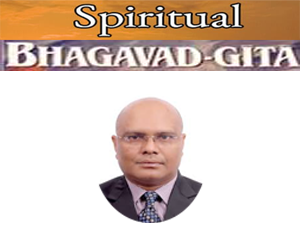TO RECIEVE EXCLUSIVE POSTS AND NEWS
24.10.2021: Every culture evolved some dos and don'ts for peace in society and with the evolution of justice systems, some don’ts have become punishable crimes. Criminal jurisprudence requires both intention and execution to be present in a crime. Intention is the thought behind the crime and execution, the physical side. Proof of both components is essential to convict any person of a crime. If we take the intention as sankalp (will or purpose) and execution as kaam (desire), we can understand Krishna’s saying, "He whose pursuits are free from kaam and sankalp ( kaam sankalp vargitaye ); whose actions are burnt by the fire of knowledge, him the wise call a pandit (sage)" (4.19). Society, in general, is satisfied as long as there is no criminal action, even if one is roaming about full of criminal intent. Krishna says that we should drop kaam first and subsequently should even drop sankalp. Dropping kaam can happen because of various reasons like fear of the law, lack of resources or to maintain one's reputation. But sankalp is much deeper and as long as it survives there is always a chance that it gets converted into kaam at a weak moment. That is why Krishna tells us to drop not only the kaam but also the sankalp, which is the driver of desires. We are repeatedly told since childhood that we should have the determination and desire to achieve academic, economic as well as personal growth, thus making our progress towards understanding this existential truth difficult. The point to be noted is that desire is desire whether noble or ignoble. When kaam and sankalp are dropped, one attains nischal (non-oscillating) samadhi (established in self) which is freedom from attachment, fear and anger. Actions arising out of such a state are bound to be burnt and purified by this very awareness. (Author K Siva Prasad is 1993 batch IAS officer, Punjab cadre)
Readers' Choice
Centre swings surprise, Gujarat DGP gets extension in service 8 hours ago
Tenure of Chhattisgarh Chief Secretary extended 13 hours ago
Rajesh Kumar appointed as Chief Secretary of Maharashtra 16 hours ago
Saswata Mishra appointed Principal Secretary to Odisha CM 17 hours ago
Special Director Intelligence Bureau to repatriate as State DGP 17 hours ago
Spiritual column: Gita Acharan (86)
By K Siva Prasad - 2021-10-24 08:47:00

24.10.2021: Every culture evolved some dos and don'ts for peace in society and with the evolution of justice systems, some don’ts have become punishable crimes. Criminal jurisprudence requires both intention and execution to be present in a crime. Intention is the thought behind the crime and execution, the physical side. Proof of both components is essential to convict any person of a crime.
If we take the intention as sankalp (will or purpose) and execution as kaam (desire), we can understand Krishna’s saying, "He whose pursuits are free from kaam and sankalp ( kaam sankalp vargitaye ); whose actions are burnt by the fire of knowledge, him the wise call a pandit (sage)" (4.19).
Society, in general, is satisfied as long as there is no criminal action, even if one is roaming about full of criminal intent. Krishna says that we should drop kaam first and subsequently should even drop sankalp.
Dropping kaam can happen because of various reasons like fear of the law, lack of resources or to maintain one's reputation. But sankalp is much deeper and as long as it survives there is always a chance that it gets converted into kaam at a weak moment. That is why Krishna tells us to drop not only the kaam but also the sankalp, which is the driver of desires.
We are repeatedly told since childhood that we should have the determination and desire to achieve academic, economic as well as personal growth, thus making our progress towards understanding this existential truth difficult. The point to be noted is that desire is desire whether noble or ignoble.
When kaam and sankalp are dropped, one attains nischal (non-oscillating) samadhi (established in self) which is freedom from attachment, fear and anger. Actions arising out of such a state are bound to be burnt and purified by this very awareness.
(Author K Siva Prasad is 1993 batch IAS officer, Punjab cadre)






























